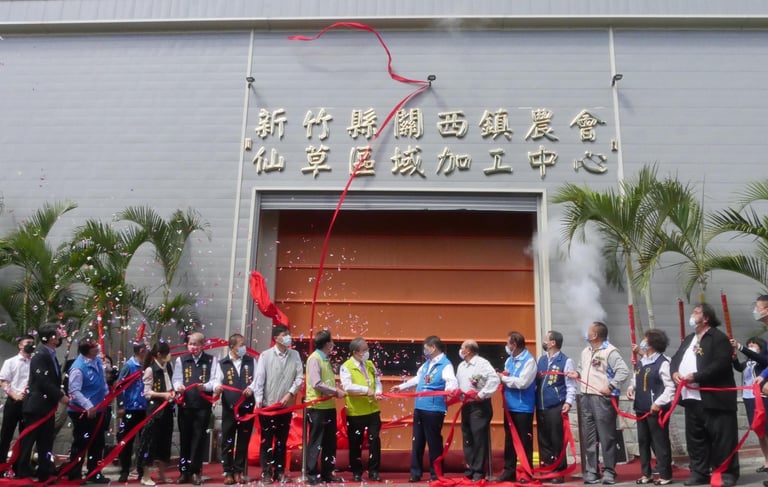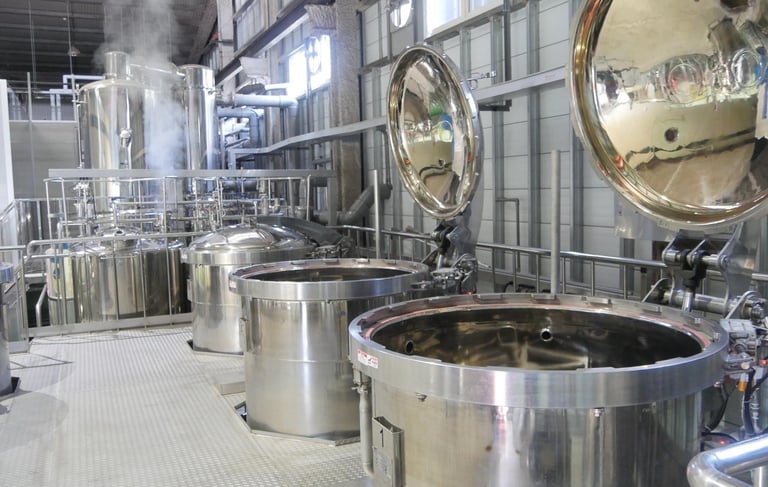Herbal jelly specialty
Grass jelly is a member of the Lamiaceae family, belonging to the genus Mesona. It is an annual or biennial herbaceous plant, resembling mint in appearance, small and greenish, with a slightly hairy texture. The leaves are arranged in a cross-radiating pattern.
The planting period for grass jelly is from March to April, and it should not be planted in succession. It is best to plant it in fields where rice has been grown. The harvest period is from September to October (during the White Dew season) before flowering. During harvest, use a sickle or hoe to cut it at the root, then turn the whole plant upside down and expose it to the sun on the field. After drying to about 70-80%, bundle them in layers and store them in a storage room; the storage place should be well-ventilated and dry. Storing for more than six months can enhance the gel strength and aroma.
The area of grass jelly cultivation in Guanxi Township is the largest in Taiwan (with small-scale cultivation in Taoyuan, Hualien, Miaoli, Chiayi, Tainan, and other cities and counties), and the quality of Guanxi grass jelly is the best, making grass jelly the best-known symbol of Guanxi Township.
Process and Features of the Guanxi Grass Jelly Processing Plant
Since its establishment in 1992, the grass jelly processing factory has become synonymous with Guanxi. The grass jelly products produced by our association have transformed from "local products" to "specialty products." The development of the grass jelly industry has become the economic enterprise of the Guanxi Township Farmers' Association, based on the association's mission to protect farmers' rights and interests, benefit farmers, serve farmers, improve farmers' lives, and develop the rural economy.
Since the establishment and operation of the "Xian Cao (grass jelly) Regional Processing Center," the quality of processed products has become more stable, and market supply and demand have been adjusted. Centered around the New Farmers Market, a standardized six-tiered industry of "production, storage, processing, and sales" has been established, passing ISO22000 and HACCP certifications. By adopting a standardized management operating model (SOP), the "Xian Cao Regional Processing Center" maximizes its benefits, creating a safe agricultural base for the sustainable operation of grass jelly, continuously ensuring and increasing farmers' profits, and aiming for consumers to eat with peace of mind and health.




仙草特色
仙草為唇型科仙草屬,一年生或越年生草本植物,外型似薄荷,小巧翠綠、略帶絨毛,葉片呈十字放射狀展開。
仙草種植時期為3-4月份,忌連作,以種植水稻後之地為佳,每年9-10月(白露)未開花前為收穫時期,收穫時以鐮刀或鋤頭於根部割斷,並將整株翻轉於畦上曝曬,待7-8分乾燥程度後,集壓成一綑一綑層堆於儲藏室內貯放;儲藏場所應選通風乾燥之處,貯藏半年以上可提高凝膠強度及香氣。
關西鎮栽種仙草面積為全臺之冠(桃園、花蓮、苗栗、嘉義、台南等縣市有少量種植),尤以關西仙草品質最佳,也讓仙草成為關西鎮的最佳代名詞。
關西仙草加工廠流程與特色
本會於民國81年成立仙草加工廠至今,仙草已成為關西代名詞,由本會所生產的仙草產品從「土產」變「特產」,以仙草產業發展成關西鎮農會的經濟事業體為其根基,基於農會宗旨保障農民權益、造福農民、服務農民、改善農民生活、發展農村經濟。
自「仙草區域加工中心」落成啟用後,更加穩定加工產品的品質及調節市場供需,以新農民市場為主體,建立標準「產、儲、製、銷」的六級化產業且通過ISO22000、HACCP認證;並採取標準化管理經營模式(SOP),讓「仙草區域加工中心」發揮最大效益,建構出仙草永續經營的安全農業基地,持續保障且提高農友收益,也讓消費者食在安心、吃出健康為目標。

Connect with us 與我們聯繫
Support 代購服務
info.foroma@gmail.com
© 2025. All rights reserved.
